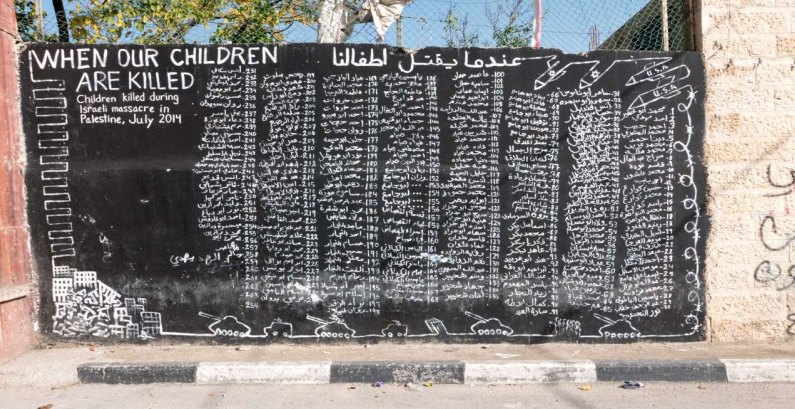With increased violence comes increased attention; news outlets are reporting and conversations are happening. It is tempting to look at what is happening in Gaza and Israel in a vacuum, thinking what has been happening this past month is the full story, but the recent media does not tell the full story. When deciding how to act, how to pray and what to say, it is important to recognize that the recent war in Israel and Gaza is not unprovoked or unprecedented. Conflict between Israel and Palestine is a complicated, decades long history in which the U.S. has not been a ‘third party’ but a deeply involved international actor through monetary aid, U.N. power and national lobbying groups.
Long called the most special bilateral relationship, Israel has
received support from the U.S. for decades. The response to this war by the U.S. government is a mirror to the past of an “ironclad support for the state of Israel” since its creation in 1948. According to the USA Facts Organization, U.S. aid to Israel from 1951 to 2022 totaled $317.9 billion, making it the largest recipient of American foreign aid since World War II. This U.S. monetary support to Israel towers over any other U.S. foreign aid. United States Agency for International Development (USAID) can be classified by economic or military aid; most of the aid the U.S. grants abroad is economic. However, between 1951 and 2022, Israel received $225.2 billion in US military aid. In 2022, 99.7% of aid went to the Israeli military. It is clear through our expenditure and allocations, that the U.S. is funding the militarization of the state of Israel, building up one of the most powerful militaries in the world.
Another way that the U.S. supports Israel is through its power in the United Nations. The U.S. is one of the five permanent members of the U.N. who holds veto power. According to Al Jazeera, since 1945, a total of 36 UNSC draft resolutions related to Israel-Palestine have been vetoed
by one of the five permanent members. Out of these, 34 were vetoed by the US and two by Russia and China. These resolutions have focused on developing a framework for peace, calling for adherence to international law and
a call for Palestinian statehood and condemnation for Israel’s treatment of Palestinians. Only once has the U.S. not vetoed a proposed resolution relating to the support of Israel.
treatment of Palestinians. Only once has the U.S. not vetoed a proposed resolution relating to the support of Israel.
Lurking in the shadows is the American Israel Public Affairs Committee (AIPAC) which is a
major reason for the U.S. continued involvement. They are a bi-partisan lobby that works to enact public policy, securing aid and passing legislation
for continued support
for Israel. AIPAC plays as a puppeteer, rewarding legislators who support
its agenda and punishing those who oppose. AIPAC is a powerful organization whose impact is largely unknown to the public. The late King Hussien
of Jordan explains, “The U.S. is not free to move except within the limits of AIPAC.”
The explanations for the unwavering commitment to Israel is nuanced. Due to their long-standing presence in the Middle East, the U.S. maintains their strong and consistent cooperation with Israel, shown to be their most reliable ally. Ideologically, the U.S. and Israel have similar agendas as it pertains to democracy, culture and values, religious roots and international concerns. With China’s growing involvement in the region, Israel seems to keep the U.S. stuck in the Middle East, in threat of allyship with China. Additionally, many give the Holocaust as a reason for the necessity of an independent Jewish state. In the aftermath of WWII, the U.S. certainly feels a sense of responsibility for this establishment.
The implications of this special relationship impact U.S. foreign policy and
tax-payer expenditure. In the opinion of Marwan Bishara, senior political analyst at Al Jazeera, Washington has long revolved around the satisfaction of Israeli needs, encouraging
peace and compromises. But ultimately, he concludes that, “in reality, unconditional US support has thus far hardened Israel’s stance, radicalized its society and driven its polity towards fascism.” No matter the intentions of U.S. support, the impact progresses militarization of the most far-right government Israel has seen, whose actions are internationally questionable at best.
National media presents a narrow view of the conflict rooted in political bias, which many believe leaves out the stories of Palestinians. As a result, empathy and justice are seldom
pursued. With a bi- partisan single story presented, citizens can choose a route with little critical thinking, following the general consensus of U.S. politicians. The U.S. involvement in the Israeli-Palestinian conflict has deep implications, not only the Middle East but American lives as well. American citizens have a deep responsibility to research, seek justice and act politically. Americans are not the only ones affected.
